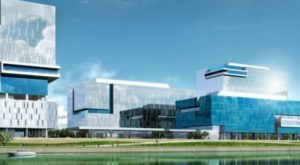A few years ago, CBD office was all the rage, but higher cap suburban properties are now finding favor.

The US office investment market did cool a bit in 2017, but that was only after a few years of record-setting investment in several metro areas. And a solid fourth quarter slowed down the rate of decline. Furthermore, US real estate remains near the top of many investors’ wish lists, and with 2018 shaping up to be a robust year for the office market, the next year should see a good number of trades. But in a search for higher yields, many investors have started looking past the top CBDs and set their sights on suburban properties.
US office sales volume in the fourth quarter was $36.2 billion, according to a recent report from Colliers International, up from $28.7 billion in the third quarter. However, a slight uptick in volume in the fourth quarter is not unusual as buyers and sellers seek to close transactions before the year end. And total US office sales volume for 2017 was $131.9 billion, down by 8% over the year.
Colliers partly attributes the slight slowdown to a sharp decline in cross-border sales, particularly from China. Foreign investors typically stick with the safest investments, usually the best properties in the nation’s core CBDs. Perhaps it’s not surprising that in 2017 attention shifted away from the six major metros (Boston, Chicago, Los Angeles, Manhattan, San Francisco and Washington, DC) whose combined sales volume of $68.7 billion in 2017 was 15% below the 2016 total. Investment activity in secondary markets showed no change at $53.8 billion.
But in search of higher yields, investors did increasingly look beyond the downtowns. Investors spent $83.1 billion on suburban properties in 2017, a a modest increase of 2% over the year, Colliers finds. Conversely, CBD sales volume fell by 21% in 2017 to $48.8 billion.
And suburbs all over the nation have benefitted from the shift. Detroit’s CBD, for example, has attracted a great deal of attention due to its rise as a tech hub, but last year Hayman Co. made one of the metro’s most significant acquisitions when it bought the 732,000-square-foot Troy Officentre in suburban Troy for $55 million. The new owners plan a $10 million renovation.
The suburbs are also now seen as a fruitful place to put creative office spaces, a style usually thought of as quintessentially urban. Chicago-based Farpoint Development recently purchased the 6300 North River Road building in suburban Rosemont, IL, and plans to transform the 1969 property into something unique. By mid-2018, the company will have ditched the 137,000-square-foot structure’s old-fashioned drop ceilings, replaced the exterior windows, stained the exterior brick, and added many new amenities including a yoga space complete with a Zen garden, the first of its kind in the suburbs.
Average cap rates held firm at 6.7% in the fourth quarter, according to Colliers, and remain tightest in the northeast and west regions at 5.7% and 6.1% respectively. Cap rates stand at 5.6% in downtown markets and 7% in the suburbs, both of which are below their long-term averages of 6.8% and 7.7% respectively.
And despite the downturn in sales volume, pricing remains aggressive in the top CBD markets with Boston, Manhattan and Seattle all having sub-5% cap rates. Manhattan saw the top three of the five largest single-asset trades by dollar value in the fourth quarter, led by Allianz RE of America’s $1.95 billion purchase of One Astor Plaza, 1515 Broadway for SL Green. A joint venture between Transwestern Investment Group and JDM Partners made perhaps the most significant suburban acquisition by buying the 2.1-million-square-foot State Farm campus in Tempe, AZ for $928 million.
By: Brian Rogal (GlobeSt)
Click here to view source article.


